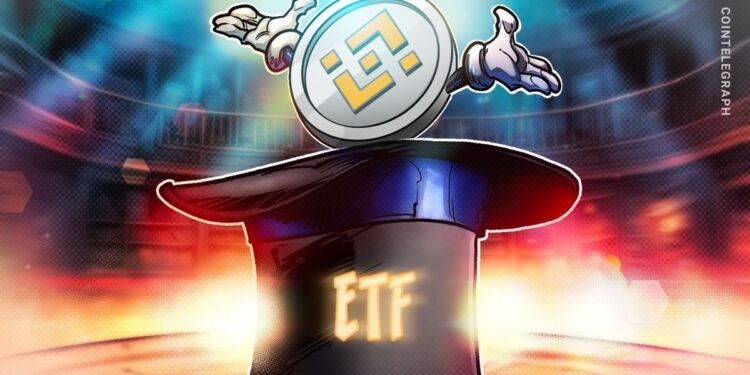Asset supervisor VanEck backed away from its earlier plans to stake property in its proposed spot BNB exchange-traded fund, regardless of providing staking in its lately launched Solana product.
In its up to date S-1 filing to the US Securities and Trade Fee (SEC) on Friday, VanEck stated “the Belief won’t make use of its BNB in Staking Actions and accordingly won’t earn any type of staking rewards or revenue of any form from Staking Actions” on the time of itemizing. The submitting additional warns that “there might be no assurance that the Belief will have interaction in any Staking Actions” sooner or later, both.
The corporate acknowledged that avoiding staking might trigger the ETF’s efficiency to lag that of holding BNB (BNB) straight, noting that buyers would forgo potential staking rewards.
This follows VanEck submitting for a spot BNB exchange-traded fund (ETF) in Might. The filing noted on the time that it “might, infrequently, stake a portion of the property by means of a number of trusted staking suppliers.” Earlier this month, VanEck additionally launched the US’s third Solana (SOL) ETF, providing staking yields.
Associated: Solana staking ETFs are ‘missing part of puzzle’: Bitwise CIO
VanEck hints at BNB’s regulatory woes
In its up to date submitting, VanEck distanced itself from any potential staking efforts and said that it could be carried out by means of a number of third-party “Staking Providers Suppliers.” Moreover, the corporate clearly said that there was no assure that any staking with ETF property would ever happen, and in the event that they had been to interact in such exercise, they might first file a prospectus with the SEC.
“The Belief just isn’t permitted to interact in Staking Actions, which might negatively have an effect on the worth of the Shares.”
Nonetheless, the submitting fails to obviously state the rationale for its cautious strategy to BNB staking, however it hints at considerations relating to regulatory troubles. A piece of the submitting clearly states {that a} dedication by the SEC that BNB is a safety might adversely have an effect on the worth of the shares and the termination of the belief.
“The take a look at for figuring out whether or not a specific digital asset is a ‘safety’ is complicated and tough to use, and the end result is tough to foretell,” VanEck stated. The fund supervisor “acknowledges that BNB might presently be a safety, primarily based on the details as they exist immediately, or might sooner or later be discovered by the SEC or a federal courtroom to be a safety.”
In such a case, VanEck might dissolve the ETF — both of its personal volition by autonomously figuring out that BNB is a safety or after the SEC or a federal courtroom concludes that it’s. “For as long as the Sponsor believes there to be good religion grounds to conclude that the Belief’s BNB just isn’t a safety, the Sponsor doesn’t intend to dissolve the Belief on the idea that BNB might at some future level be decided to be a safety,” the submitting stated.
Associated: Grayscale debuts Solana ETF, joining Bitwise in SOL staking ETF race
BNB’s previous brushes with the SEC
As VanEck identified, in 2023, the SEC filed lawsuits in opposition to crypto exchange Binance, its US-based competitor, Coinbase, and Kraken for facilitating the buying and selling of unregistered securities. The regulator deemed 68 digital assets to be securities on the time, together with BNB. Nonetheless, in early July final yr, a US federal courtroom discovered that secondary gross sales of the BNB token did not constitute security transactions.
Whether or not staking and cryptocurrencies that make use of it fall underneath securities regulation has been topic to intense debate. Again in late Might, the SEC’s Division of Corporation Finance said in an announcement that “Protocol Staking Actions” resembling crypto staked in a proof-of-stake blockchain, “don’t have to register with the Fee transactions underneath the Securities Act,” or fall inside “one of many Securities Act’s exemptions from registration.”
Nonetheless, this didn’t settle the talk. On the time, Caroline Crenshaw was the only commissioner who opposed the steering, saying it “fails to ship a dependable roadmap for figuring out whether or not a staking service” is an funding contract underneath securities legal guidelines.
Journal: Ethereum’s Fusaka fork explained for dummies: What the hell is PeerDAS?



















